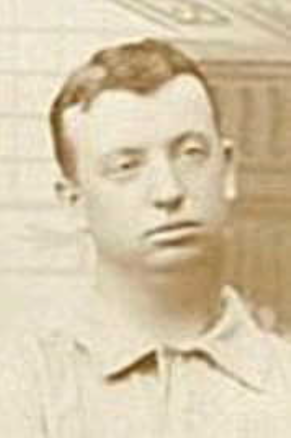 Thomas Gilbert Vickery was a pitcher (and, according to articles, a puncher and kicker – earning the nickname “Vinegar Tom”) in the early 1890s. His first taste of the big leagues was with the Philadelphia NL club in 1890, getting a chance because so many players jumped to the Players League. (He had a good season at Toronto in 1889, which earned some consideration.) Knowing that the brotherhood might affect the National League teams’ ability to sign players, the owner of the Phillies, Al Reach, picked up a few players from minor league clubs, including Vickery and Jake Virtue.
Thomas Gilbert Vickery was a pitcher (and, according to articles, a puncher and kicker – earning the nickname “Vinegar Tom”) in the early 1890s. His first taste of the big leagues was with the Philadelphia NL club in 1890, getting a chance because so many players jumped to the Players League. (He had a good season at Toronto in 1889, which earned some consideration.) Knowing that the brotherhood might affect the National League teams’ ability to sign players, the owner of the Phillies, Al Reach, picked up a few players from minor league clubs, including Vickery and Jake Virtue.
To Vickery’s credit, he pitched well, going 24-21 with a better than average ERA (3.44). However, he was a bit wild – 184 walks, a league leading 29 batters hit by pitches, and 23 wild pitches. Vickery could throw hard, but he relied on a wide variety of breaking pitches, claiming to throw sixteen different versions of a curveball. He also once won a long toss contest, throwing a baseball some 386 feet (about 15 feet shy of the record at the time). And while his long looping delivery was frequently very effective, the wildness of his pitches and his temper contributed to umpires assinging him fines for arguing about ball and strike calls. As for his inconsistency, he faced Boston four times in 1890 – two complete game wins (one shutout) and twice getting knocked out of the box early because he was getting pounded. And the Philadelphia Inquirer noted that he pitched his best games “…as he always does against a weak club.”
When some normalcy returned to the major leagues in 1891, Vickery was used far less in 1891 with the Chicago Colts, just 12 starts toward the end of the season, but he earned the opportunity after some fine work with Milwaukee that year (22-15, 2.30). While with Milwaukee, Vickery threw a no-hitter to beat Denver on April 27. This would be his next two seasons, too – a good run in the minors and a brief, erratic run with a major league team. In 1892 it was Omaha then Baltimore in the National League. It changed order some in 1893. He started in the Southern League, got called to Philadelphia. who gave him a second chance, and then he was released to the minors where he became a nomad of sorts. He found some continuity (and a good team) in Hartford where he won 30+ games in both 1896 and 1897 but 870 innings over two seasons in a lower level league is tough on an arm. In 1897, he struck out about 35% fewer batters in a comparable number of innings. His next two years weren’t very successful and his career soon came to an end. (He still played some amateur baseball if not professionally. In the 1905 New Jersey census, he listed his profession as ballplayer.)
Tom Vickery was born in Milford, Massachusetts on May 5, 1867, though his obit suggested he was born in Burlington County, NJ and spent a lot of time with grandparents in Bristol, PA. He was the second of three children (John, Thomas, and Mary) born to Civil War veteran John Vickery and his wife Emily Shute. After the war, John worked as a butcher and laborer to support his Burlington based family.
Thomas Vickery married Elizabeth Beaber Worth as his 1890 season ended. They had two children: Ruth and Parker, both born during Vickery’s more nomadic baseball period. However, he left his wife in 1898 and by 1904 Elizabeth was granted a divorce and custody of the two children. In later years, Tom worked as a retail merchant at a candy store in Burlington county.
According to his obit in the Bristol Daily Courier, Vickery died on March 21, 1921 in the Burlington County hospital, located in Mount Holly township, after a lengthy illness at 53. His earthly remains were interred in the Odd Fellows Cemetery and Mausoleum in Burlington County near his father.
Notes:
US Census: 1870, 1880, 1900, 1920
New Jersey Census: 1905
Baseball-Reference.com
FindAGrave.com
Image of Vickery posted to Ancestry.com by user DeniseHudson44.
“Old Ball Player Dies in Hospital, Bristol (PA) Daily Courier, March 21, 1921: 4.
“Pugnacious Pitcher Vickery,” (Camden) Daily Post, December 3, 1905: 1.
“Divorced From Ball Player,” Holyoke Daily Transcript, May 6, 1904: 2.
“Five Independent,” Minneapolis Daily Times, November 1, 1889: 1.
“The Association Players,” Buffalo Courier, March 22, 1889: 3.
“Base Ball Notes,” Philadelphia Times, September 8, 1889: 16.
“Green’s Poor Support,” Hamilton Daily Spectator, May 18, 1889: 3.
“The Phillies’ Easy Task,” Philadelphia Inquirer, August 22, 1890: 3.
“Milwaukee Shuts Out Denver,” Kansas City Times, April 28, 1891: 3.
“Sporting in General,” Pittsburgh Press, August 16, 1893: 5.
